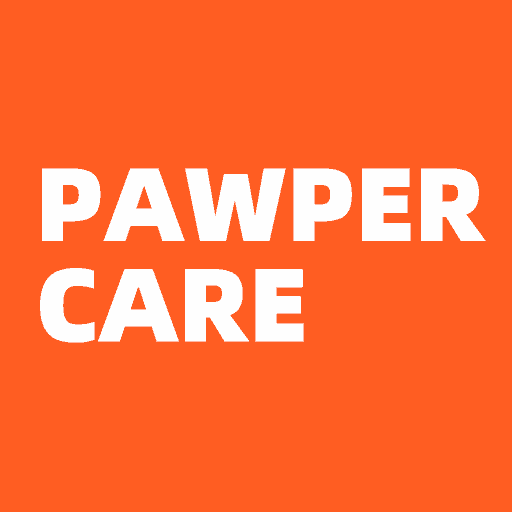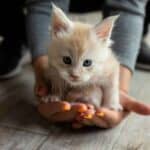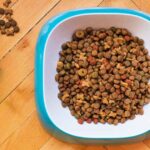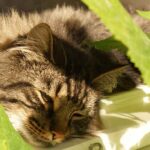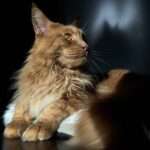Last night, as I sat curled up on my couch, enjoying a bowl of rich chocolate ice cream, I caught my Maine Coon, Bella, eyeing my dessert with what seemed like a longing gaze.
As a pet parent, I often share my joys with Bella, but this time, I hesitated. “Can cats have chocolate ice cream?” I wondered.
While it’s tempting to share everything with our furry companions, especially when they look at us with those big, pleading eyes, not everything safe for us is safe for them.
This article is a journey into understanding why chocolate ice cream and cats, particularly our regal Maine Coons, are not a match made in heaven.
Why Cats Should Avoid Chocolate Ice Cream?
The Hidden Dangers of Theobromine
The primary reason chocolate is off-limits for cats, including Maine Coons, is theobromine.
It’s a bitter alkaloid found in chocolate, and while humans can handle it just fine, it’s a different story for cats.
Our feline friends metabolize theobromine much slower than we do. This slow process can lead to a dangerous buildup in their system.
Even a small amount of chocolate can cause issues like rapid heart rate, tremors, seizures, and in severe cases, death.
The darker the chocolate, the more dangerous it is, as it contains higher levels of theobromine.
A study published in the Journal of Veterinary Medicine reported several cases of theobromine poisoning in cats.
In these cases, symptoms varied from mild digestive upset to more severe signs like heart arrhythmias and seizures.
The study emphasized the need for pet owners to be aware of the risks associated with chocolate and to keep such items out of reach of their pets.
Lactose Intolerance and Its Effects
Another reason to avoid giving chocolate ice cream to cats, particularly Maine Coons, is lactose intolerance.
Cats lose their ability to process lactose after kittenhood. This means that dairy products can cause gastrointestinal distress.
Symptoms of lactose intolerance in cats include bloating, gas, diarrhea, and general discomfort.
These symptoms are uncomfortable for your cat and can lead to dehydration and other health issues if not addressed.
The ASPCA has reported on the prevalence of lactose intolerance in adult cats and advises against feeding them dairy products. Instead, they recommend lactose-free alternatives or simply avoiding dairy altogether. This is especially important for Maine Coons, who may have sensitive digestive systems.
Sugar and Fat: A Recipe for Health Problems
The high sugar and fat content in chocolate ice cream is another concern.
Cats, especially indoor breeds like Maine Coons, don’t need a lot of calories in their diet.
Excessive calorie intake can lead to obesity, a growing problem among domestic cats.
Obesity in cats can lead to a host of health problems, including diabetes, liver disease, joint pain, and decreased lifespan.
A report by a leading veterinary nutritionist highlighted the dangers of high-calorie treats like ice cream in a cat’s diet.
It stressed the importance of maintaining a balanced diet that meets the nutritional needs specific to felines.
Cats require a diet high in protein and low in carbohydrates. Chocolate ice cream, unfortunately, offers the exact opposite.
Safe and Healthy Alternatives
Homemade Frozen Treats for Cats
Instead of chocolate ice cream, consider making homemade frozen treats that are safe and healthy for your Maine Coon.
Start with cat-friendly ingredients, like lean meats (chicken, turkey, or fish), pureed fruits (melon or banana), or even catnip.
You can puree these ingredients and freeze them in small portions.
These treats are safe and can be fun to keep your cat hydrated, especially during the warmer months.
For example, you could blend cooked chicken with broth and freeze this mixture in an ice cube tray.
Once frozen, these can be given to your cat as a refreshing treat. Another idea is to mash some ripe bananas, mix them with water or unsweetened yogurt, and freeze them in small dollops.
Nutritionally Balanced Commercial Treats
If making homemade treats isn’t your thing, many commercially available cat treats are safe and nutritionally balanced.
When choosing commercial treats, look for options that are low in calories, high in protein, and free from artificial additives.
Many pet food companies now offer treats explicitly formulated for cats, including those that cater to specific dietary needs or health conditions.
For Maine Coons, who may have specific dietary requirements due to their size and breed characteristics, it’s crucial to select treats that align with their nutritional needs.
For instance, treats that support joint health or that are designed for long-haired breeds can be beneficial.
Creative Alternatives for Interactive Play
Another way to treat your cat is through interactive play.
Maine Coons are known for their playful and intelligent nature, so engaging them in activities can be just as rewarding as food treats.
Consider toys that stimulate their hunting instincts or puzzles that challenge their minds. These activities not only provide entertainment but also promote physical and mental health.
For example, a laser pointer can provide hours of fun and exercise, as your Maine Coon chases the elusive red dot. Puzzle feeders, where your cat has to figure out how to get to the food, are great for mental stimulation.
These types of activities are essential for indoor cats like Maine Coons,to keep them physically fit and mentally sharp.
It’s crucial to balance playtime with relaxation, ensuring your Maine Coon gets enough rest after these stimulating activities.
Incorporating Healthy Snacks into Their Diet
Healthy snacks can also be a great alternative to chocolate ice cream.
Small pieces of cooked chicken, turkey, or fish are excellent protein sources. For a more novel treat, consider offering your Maine Coon small portions of cooked eggs or vegetables like steamed broccoli or carrots. These not only provide variety in their diet but also contribute essential nutrients.
When introducing new snacks, do so gradually and in moderation. It’s vital to observe how your cat responds to these new foods and ensure they don’t replace their regular, balanced meals.
Always consult with your veterinarian before making significant changes to your cat’s diet, especially if your Maine Coon has specific health concerns or dietary restrictions.
The Role of Hydration in Feline Health
Hydration is a crucial aspect of feline health that is often overlooked.
Encouraging your Maine Coon to drink more water can be as beneficial as offering healthy treats.
Many cats prefer running water, so investing in a cat water fountain can encourage them to drink more. You can also add water or broth (ensure it’s onion and garlic-free) to their food to increase their fluid intake.
Hydration is especially important for Maine Coons, who may be prone to certain health conditions that can be exacerbated by dehydration, such as urinary tract issues or kidney problems.
Providing multiple water sources around your home and ensuring fresh and clean water can help maintain optimal hydration.
Conclusion
Replacing chocolate ice cream with safe, cat-friendly alternatives is a responsible choice that can contribute significantly to your Maine Coon’s health and well-being.
From homemade treats to hydration and interactive play, there are numerous ways to indulge your cat safely. These alternatives not only avoid the risks associated with harmful foods like chocolate but also provide opportunities to enhance your bond with your Maine Coon through shared experiences and care.
As Maine Coon owners, it’s our duty to ensure our pets’ diets and activities contribute positively to their overall health. The next time you’re tempted to share a human treat with your cat, remember the many safe, healthy, and enjoyable options available. After all, isn’t the health and happiness of our feline companions worth a little extra effort?
